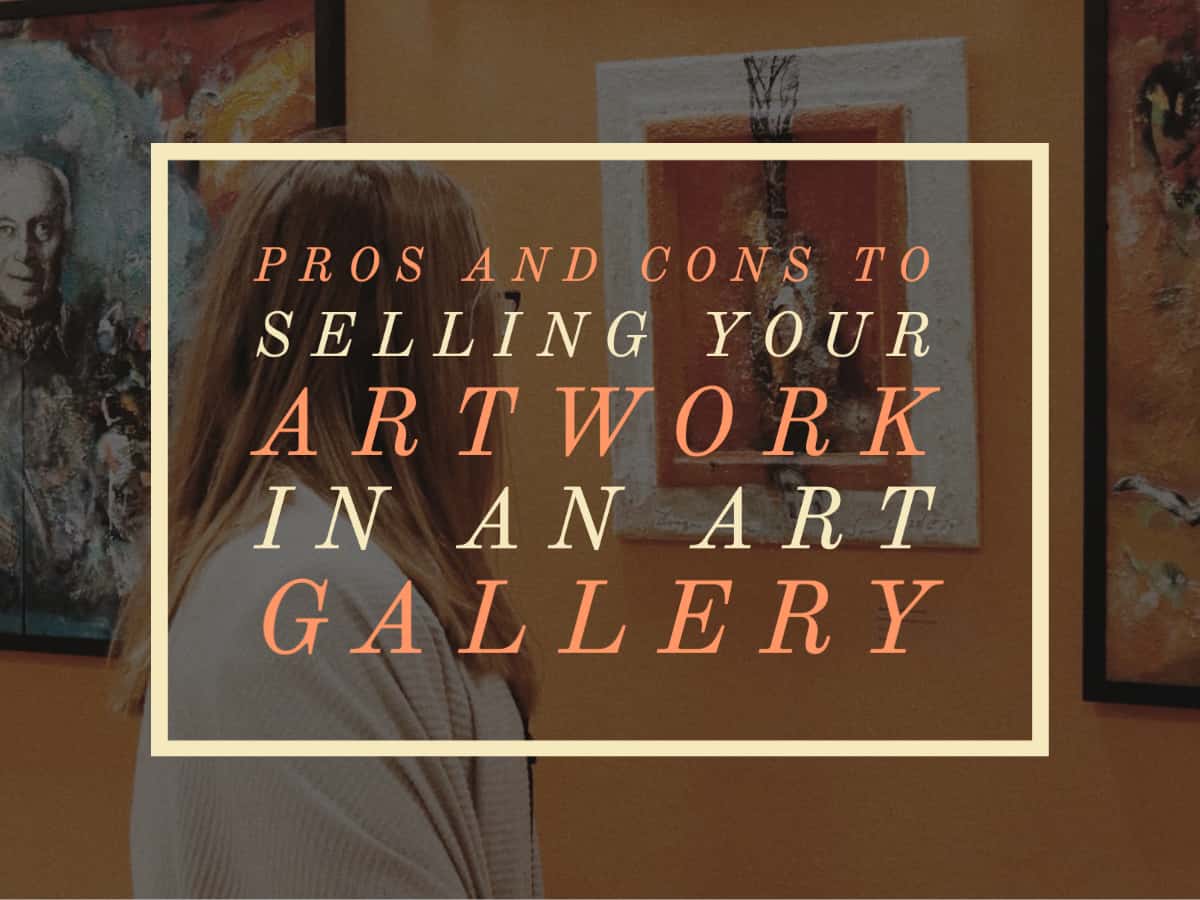When most artists consider selling their artwork, one of the first places they think about selling their art is at an art gallery. For centuries artists have sold their art through the art gallery model of selling
In times past, the only way an artist could make a living with their art was through art commissions or by selling their art through an art gallery. There were not many choices in how they could sell their art.
Table of Contents
- Advantages and Disadvantages of Selling Art to a Gallery
- All About Selling Your Art To An Art Gallery
- Pros of Selling Your Art To An Art Gallery
- Cons of Selling Your Art To An Art Gallery
- Frequently Asked Questions
- Related Questions
Advantages and Disadvantages of Selling Art to a Gallery
When selling your art to an art gallery there are many pros and cons that you need to consider. One of the major pros is that the gallery usually helps you to market your artwork. A major con is that you usually lose control over who buys your artwork. An artist needs to weigh out if selling through an art gallery is what they want to consider to sell their artwork.
Selling your Art to an Art Gallery is the oldest way that art has been bought and sold. Art Galleries started in the 19th Century.. Though the Art Gallery is the oldest model of selling art, it is still a viable way to sell your art today.
All About Selling Your Art To An Art Gallery
Even with all the changes in the internet and online art sales, art galleries are still very important to artists, collectors, and the art scene. This is because an art gallery offers to the artist services that they may not be able to obtain any other way.
There are still many artists who work only with art galleries and depend exclusively on the art gallery to sell their art. For a long time, the art gallery model for selling art has been suffering. Many say that many of the Art Fairs have driven the collectors out of the galleries and into some of the many Art Fairs that have become, popular. Others say that it is because of online sales.

In many major cities around the world like New York, Art Galleries will continue to be an important part of the art scene. Many people and collectors only want to buy art from galleries they know and they will want to see the piece of art before they buy it.
In order to survive in this time of online and internet sales, many art galleries have also been forced to adapt. They have been forced to get into the online business of selling art just so they can survive in our new world of the internet, social media, and social distancing.
Pros of Selling Your Art To An Art Gallery
There are many pros to selling your art to an art gallery. This is because the service the art galleries offer is a very valuable service. A good Art Gallery is a professional who knows their job and knows if your artwork will sell or not and who may possibly buy it.
Some Pros in Selling Your Art To An Art Gallery
Promotes Your Artwork And You As An Artist
An Art Gallery will usually always help you to promote your artwork. They have just as much interest in selling your work as you do.
This is why Art Galleries will invest in things as an Art Show to try to get buyers to come in to look at your artwork. They are in business and need to sell your artwork to continue to survive.
Know the Buyers and Collectors of Art
A good art gallery will know who the buyers are who buy art, including the art collectors. They can reach out to them and tell them about your art and why they feel buying your art would be a good investment.
Many artists fail to understand that art galleries are in business and as a business, they must earn a profit to survive. If your work sells well, normally they will want to continue to sell it and promote your work.
Allow You To Concentrate Mainly On The Art
If you have an association with a very good Art Gallery, this will allow you to concentrate mainly on the art. It is in the interest of the Art Gallery to have you paint. They want to have more artwork that they can sell.
For a lot of artists, this is the most appealing part of an Art Gallery selling your work for you. You can concentrate on your art and allow them to handle a lot of the business side of your art business.
They Are The Experts In Selling Art
A good art gallery can be worth every single penny you give them. They should know the business and know how to sell your art. That is their business. They can give you exposure and clients that you could never get on your own.
This is why some art galleries may want to have some say in the creative process. They may tell you to paint this style or these colors as they know they will sell.
Cons of Selling Your Art To An Art Gallery
As with the Pros, there are also cons of selling your artwork to an art gallery. Some artists may feel an art gallery takes too much commission or asks too much of them, but they forget that a good art gallery also needs to invest a lot to promote you as an artist and your artwork.
An Art Gallery is in the business of selling art, so as long as your art sells for them and they can make a profit they will probably be happy, but if it does not they may drop you as an artist.
Some of the Cons in Selling Your Art To An Art Gallery
Lose Control of Your Art Sales Process
When you give your artwork to be sold in an art gallery you do not really have much control as to who or where it will be sold. The Art Gallery is in the business to make money and to sell the art, so generally, they will sell it to whoever they want to sell it to. You have turned over the sales role of your artwork to the Art Gallery.
The Art Galleries will usually set the price for the art and what they feel the market can bear. Some Art Galleries may work together with the artist on this and others may set the price themselves. The truth is that by working with an art gallery you are handing the control for the sale of your artwork over to them. You may not have much control over this and you may feel they either under or overprice your work.

May Only Do Art Commissions
Art Galleries generally work two ways with an Artist. One way is they may buy the work outright from you and then sell it. This would be a transaction just like you sold the art to someone else. For an Art Gallery to buy your art outright from you they would need to be certain that your artwork is going to sell and they can make a nice profit on it.
The more common way that most artists will find is that the art gallery will pay a commission for the art once it is sold. You will put your art in their gallery and once it is sold you will get paid. If it does not sell after a period of time the art gallery may ask you to come to get it and take it out.
The commission most art galleries charge can be 30 to 40% or even higher (or lower). This will depend a lot on the contract and agreement you have with the Art Gallery. They need to charge commissions as they are a business and as a business, they need to sell art to survive.
Maybe Other Restrictions
Some art galleries may have other restrictions as the artist must be able to produce so many works of art over a certain period of time. They may restrict where and how the artist can sell their other work or if the work can only be sold through their art gallery. Other art gallery owners may be very relaxed and not have many restrictions.
This all really depends on the art gallery you are working with. If you wonder why there are restrictions the reason is that for an Art Gallery to take on your work they also need to invest in you as an artist, so they may want to have some artistic and other say in the work.
May Not Accept Your Art
The art gallery may not accept your artwork. They may like it but decide it will not sell. Or they may think you are talented but they do not want to invest in promoting you and your artwork.
There is also no guarantee that even if they take you on as an artist the work will even sell. They may call you a month or so later and tell you to come to pick up your paintings as they did not sell and they do not want them in their gallery.
For many artists, this may be hard to understand as they feel like if they put it up in an art gallery it should sell and that should be it. But an art gallery is about running a business. Every single square inch of their floor space and walls costs money. They need to have art up on their walls that they know they can sell and by artists that they know they can promote.
When the art gallery is promoting you as an artist it costs money and is a risk for them. In a tough business environment, most Art Galleries will want to only work with artists that they know can sell their art and turn a nice profit.
Still, Need Legal and other Paperwork
Just because you are selling to an art gallery does not mean that you do not need to do any legal or other paperwork. You are the seller and they are usually the buyer. There will need to legal business paperwork between you both.
In the United States, you will more than likely need to have a reseller’s license. This can change from state to state. You can find out more about the reseller’s license here.
For many artists selling their art to an art gallery may be the best method for them to sell their art. For others, it may not be an option or they may feel they want to sell their art another way or method. No matter what method you choose, knowing about the pros and cons of selling your art at an art gallery is important to understand.
Frequently Asked Questions
What are the advantages of selling artwork through an art gallery?
Art galleries provide exposure to a wider audience, enhance an artist’s credibility, and often handle marketing and sales, allowing artists to focus more on their craft.
Are there financial benefits to selling art through galleries?
Yes, galleries can facilitate higher sales prices for artwork due to their established reputation and clientele, leading to potentially increased income for artists.
Do art galleries help in building an artist’s professional network?
Absolutely, galleries offer networking opportunities with other artists, collectors, and industry professionals, fostering potential collaborations and career advancement.
What challenges might artists face when selling through galleries?
Artists may experience a loss of control over pricing, representation, and exhibition decisions. They might also face commission fees that impact their overall earnings.
Can artists retain more creative control when selling independently?
Yes, selling independently allows artists to have greater control over pricing, presentation, and the narrative surrounding their artwork without the influence of gallery expectations.
How does the gallery model impact an artist’s exposure and recognition?
Galleries can significantly boost an artist’s exposure, leading to increased visibility and potential recognition from art critics, collectors, and the broader art community.
Are there potential downsides to relying solely on gallery representation?
Yes, artists might become overly dependent on galleries for their career growth, potentially limiting their ability to explore alternative sales channels or self-promotion.
Can emerging artists benefit more from gallery representation?
Yes, galleries can offer emerging artists a platform to showcase their work to a broader audience, accelerating their recognition and establishing a foundation for future independent endeavors.
How do gallery commissions affect an artist’s income?
Gallery commissions, usually a percentage of the sale price, can reduce an artist’s income. However, the trade-off is often justified by the increased exposure and professional support provided.
Is it possible to strike a balance between gallery representation and independent sales?
Yes, many artists successfully balance gallery representation with independent sales, allowing them to diversify their income streams and maintain a level of control over their artistic career.
Anita Louise Art is dedicated to art education, great artists, and inspiring others to find and create their art. We love art that uplifts and inspires. #ArtToMakeYouSmile! #ArtToMakeYouHappy!
If you want to see any of my art, you can find out more by clicking here. If you are interested in what inspires me and my paintings, you can discover more by clicking here.
We have a free newsletter and would love you to be part of our community; you can subscribe to the newsletter by clicking here. If you have any questions, I would be happy to talk to you anytime. You can reach me, Anita, by clicking here.
Subscribe to our Anita Louise Art YouTube Channel with great videos and information by clicking here.
Join us for our podcast “5 Minutes With Art.” Spend just 5 minutes a week with us to discover and learn about great art and artists. You can find out more about our podcast by clicking here.
Related Questions
How Do I Sell My Artwork At the High Point Furniture Market?
The High Point Furniture Market is in North Carolina and takes place during April and October each year. There are many artists who will sell their artwork or art prints direct to interior designers, architects and retail stores at the High Point Furniture Market. Like any kind of selling your art, there are pros and cons to selling your artwork at the furniture market. If you do not want to set you your own booth to sell your art there you can also look at other ways you can sell your artwork at the High Point market. But whatever method you choose to sell your artwork, you should do your homework ahead of time of who to contact at the High Point Furniture Market.
You can find out more about selling your artwork at the High Point Furniture Market by reading our blog Complete Guide to Selling Your Artwork at the High Point Furniture Market by clicking here.
What Are Some Business Strategies to Help You Sell Your Art?
Becoming a professional artist is like being a business entrepreneur. You have to learn some basic business principles in order to survive in selling your artwork. Some basic business strategies that you can use to help you sell your artwork are to 1) make buying your art easy 2) find ways to make your art attractive to potential buyers, 3) show your customers how satisfied they will be when they purchase your art and 4) also show your customers how you are the clear and obvious choice for them when they want to purchase your artwork.
You can discover more by reading our blog on 4 Proven Business Strategies to Help You Sell Your Artwork by clicking here.

